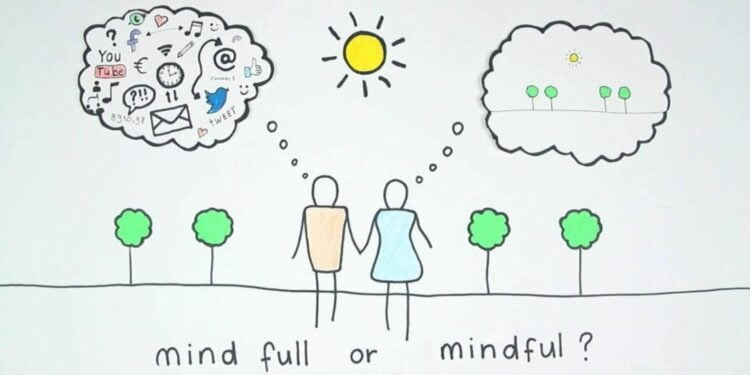We are living in a fast-paced & competitive eon, for bread and butter & to live a fuller life. The day-to-day challenges we face often trek towards unwanted emotions & feelings such as lack of confidence & motivation, anger & irritability, being sad & gloomy, fear & worry etc. eventually leading individuals to either anxiety or depression. To overcome these, we resort towards mindfulness-based practices viz; meditative approaches, and other techniques for mind healing without understanding if it is an appropriate remedy for an individual’s current mental health from a neuroscientific perspective. To understand better the effects of mindfulness meditative approaches it is vital to understand the concept of brain waves. The brain waves are the rhythmic or repetitive pattern of neuro-electrical activity creating neural oscillations due to neural interactions in the brain. There are five types of brain waves (gamma, beta, alpha, theta, & delta waves) that differ in their amplitudes & frequencies, oscillating at most active state (highly focused, engaged & attentive task-gamma & beta waves) to least active state (deepest level of relaxation to restorative deep sleep-delta waves). For example: Beta waves are characteristics of a strongly engaged mind present in active conversation/debate/a talk show.
Multiple research evidence by cognitive neuroscientists & neuropsychologists have demonstrated that mindfulness meditative approaches alter synchronization pattern of brain waves. It is important to understand the basic neuroscientific fact that synchronization pattern & harmonics of brain waves is different for psychological disorders like anxiety & depression from a cognitive, psychological, and physiological perspective. Indulging in any mindfulness meditation without understanding these differences could lead to unusual and unexpected outcomes.
The Pros- make one’s mind – ‘mindful’
- Controlled MBP’s helps to restore sleep and manage insomnia depending on one’s psychological condition.
- Better patience & tolerance in terms of controlling anxious thoughts.
- Developing new insights on stressful situations & tackling them
- Increased imagination & creativity
- Better focus on present than past or future
- Increased self-awareness
- Lower resting heart rate & resting blood pressure
- Lower levels of stress hormones like cortisol and Adrenalin.
The Cons- make one’s mind- Mind ‘FULL’
- Depression, pain, events of psychosis & mania, muddled with intensity & length of meditative practices, psychological stressors, and psychiatric histories.
- Re-experiencing trauma or flashbacks with severe bouts of crying & increase in depressive episodes.
- Insomnia or disrupted sleep/wake cycles or dysregulated arousal due to increased self-awareness (mind & body both)
- Increase in levels of anxiety.
- Emotional blunting or stoicism
- Social withdrawal & signs of dissociation
- Perceptual hypersensitivity- becomes overwhelming when one can’t stop hearing the clock ticking when trying to sleep.
- Executive dysfunction like decision making, memory lapses, planning, reasoning & other cognitive skills are often conceded & impaired.
- Besides, the most crucial point is considering the harmonization of brain waves while practicing mindfulness as one brain wave is prominent during active tasks and other during deep relaxation/sleep & may worsen one’s existing psychological condition.
As the awareness about mental health & its impact on overall well-being is increasing so are the approaches to tackling issues related to mind-brain-behavior. MBP is one of the approaches in terms of mind healing and has become a fad. However, it is not without its own pitfalls as discussed above & if practiced without having a full understanding of underlying issues from a neuroscience perspective may tramp potential repercussions for one’s mind-brain health.
The Cognitome program aims at identifying the correct neuropsychological condition & co-morbidities along with deciphering its root cause & extent of severity, before moving to therapeutics. Based on our experience in the field of neuroscience, we are aware that neuropsychological conditions also affect one’s cognitive behavior and cognitive abilities & hence our treatment protocol is based on a holistic neuroscientific therapeutic approach to take care of them as well. It is therefore advisable to not jump the gun, instead consult an expert before starting any of the mindfulness-based practices.
By Dr. Mohita Shrivastava, Ph.D
Founder & CEO, Cognitome Program, Cognitome LLC











